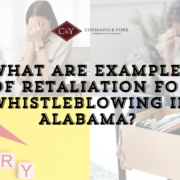Do Whistleblower Laws Apply to Private Companies in Alabama?
Whistleblowing plays a vital role in exposing unethical business practices and safeguarding public health and safety in Alabama and across the nation. Whistleblower laws act as a shield for employees who courageously report wrongdoing within their organizations, ensuring that they can speak truth to power without fear of retaliation.
In Alabama, as in many other states, the decision to blow the whistle on illegal or unethical conduct can be a difficult one. Employees may worry about the potential consequences for their careers, their reputations, and their financial stability. Understanding the legal protections available to whistleblowers in Alabama is crucial for empowering employees to come forward and for promoting a culture of integrity and accountability in the private sector.
Alabama’s At-Will Employment Doctrine: A Double-Edged Sword
Alabama adheres to the at-will employment doctrine. This means:
- Employers can fire employees at any time, for any reason (except illegal ones).
- Employees can quit at any time, for any reason.
While this doctrine gives employers flexibility, it also leaves employees vulnerable to retaliation for whistleblowing. The fear of losing one’s job can be a powerful deterrent to speaking out against wrongdoing.
But here’s the thing: no one should have to choose between their livelihood and their integrity. Whistleblowers are the unsung heroes of the corporate world, shining a light on corruption and misconduct that might otherwise go unchecked. They deserve protection, and that’s where whistleblower laws come in.
The Patchwork of Whistleblower Protections in Alabama
When it comes to whistleblower laws, Alabama presents a mixed bag:
- Public sector employees have some protections under state law.
- Private sector employees have limited protections under state law.
- Federal laws offer some protections for private-sector employees.
This patchwork of protections can make it challenging for Alabama whistleblowers to know their rights and assert them confidently.
For public sector employees, the Alabama State Employee Protection Act provides some safeguards against retaliation. If you work for a state agency and report wrongdoing, you may have recourse under this law. But what about private sector employees?
Unfortunately, Alabama doesn’t have a comprehensive state law protecting private sector whistleblowers. There are some narrow exceptions, such as the Alabama Workers’ Compensation Act, which prohibits retaliation against employees who file workers’ comp claims. But for the most part, private sector whistleblowers in Alabama have to rely on federal protections.
Federal Whistleblower Laws: A Lifeline for Alabama Employees
While Alabama may lack comprehensive state-level protections, federal laws provide some relief:
- The Sarbanes-Oxley Act (SOX) protects employees who report corporate fraud.
- The False Claims Act (FCA) protects employees who report fraud against the government.
These laws apply to private sector employees in Alabama, but navigating their requirements can be tricky. Consulting with an experienced attorney is often necessary to ensure eligibility and follow proper procedures.
Let’s take a closer look at these federal lifelines:
The Sarbanes-Oxley Act was enacted in the wake of the Enron scandal to protect employees who blow the whistle on corporate fraud. If you work for a publicly traded company in Alabama and report financial misconduct, you may be protected under the Act. But there are some key requirements:
- You must report the misconduct to a supervisor, federal agency, or Congress.
- You must have a reasonable belief that the misconduct violates securities laws or SEC rules.
- You must file a complaint with the Department of Labor within 180 days of the retaliation.
The False Claims Act (FCA), on the other hand, is designed to combat fraud against the government. If you work for an Alabama company that contracts with the federal government and you report false claims or overbilling, you may be protected under the FCA. But again, there are some hoops to jump through:
- You must file a qui tam lawsuit under seal in federal court.
- The government may choose to intervene in your case.
- You may be entitled to a percentage of any recovered funds.
These federal laws provide valuable protections for Alabama whistleblowers, but they’re not always easy to navigate. That’s where legal expertise comes in.
Overcoming Obstacles: Challenges for Alabama Whistleblowers
Blowing the whistle in Alabama’s private sector is not for the faint of heart. Even with federal protections, whistleblowers face a range of challenges:
- Proving retaliation: Employers rarely admit to retaliating against whistleblowers. Proving that adverse actions were a result of whistleblowing can be difficult.
- Navigating complex laws: The interplay between state and federal whistleblower laws can be confusing. Knowing which law applies to your situation and how to assert your rights under that law requires legal knowledge.
- Facing powerful opponents: Whistleblowers often find themselves up against well-resourced companies with teams of lawyers. Going it alone can be intimidating and overwhelming.
- Dealing with personal and professional fallout: Whistleblowing can take a toll on your mental health, relationships, and career prospects. Finding support and building resilience is crucial.
Despite these challenges, Alabama whistleblowers should not be discouraged. With the right legal guidance and personal support, you can overcome these obstacles and make a real difference.
Protect Yourself and Your Community: Your Voice Matters
Blowing the whistle in Alabama’s private sector can be a daunting prospect, but it’s a vital one. By speaking out against wrongdoing, employees protect not only themselves but also the public interest. While Alabama’s whistleblower protections may be limited, federal laws and experienced legal advocates provide hope.
At Coumanis & York P.C., we are committed to empowering Alabama’s whistleblowers. Our employment lawyers have the knowledge and experience to guide you through the complex legal landscape and fight for your rights. If you have faced retaliation for whistleblowing in Alabama, contact us today for a consultation to assess your case and discuss your legal options. We are ready to go to work for you!






Leave a Reply
Want to join the discussion?Feel free to contribute!